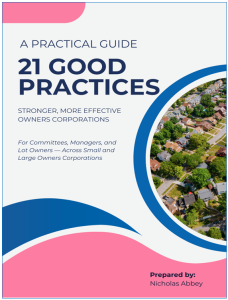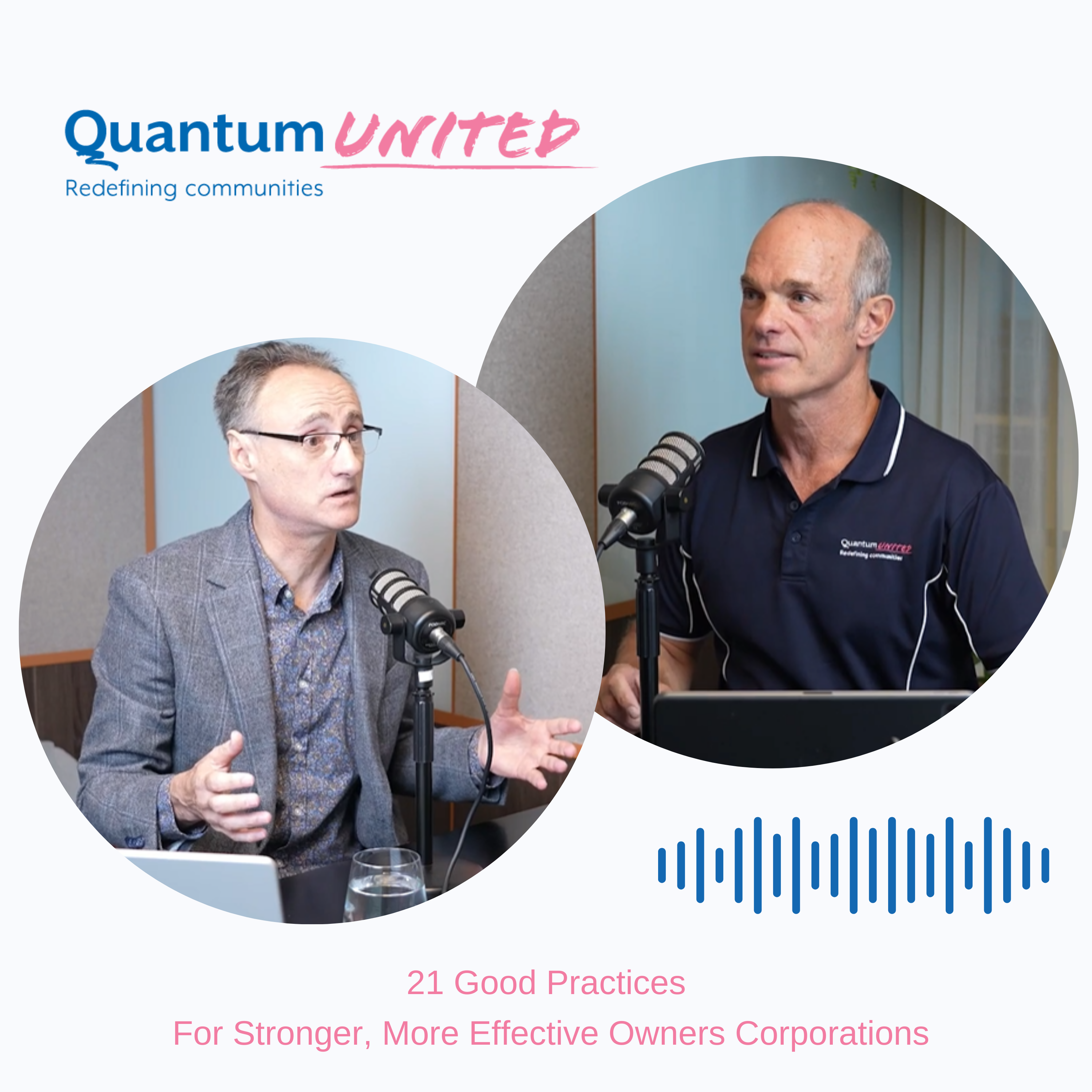In this episode of Quantum Conversations, our Founder, Michael sits down with respected strata governance leader Nic Abbey to unpack his 21 Good Practices for Stronger, More Effective Owners Corporations. What follows is one of our most practical and reflective conversations to date—an exploration of what it means to lead with intention, clarity, and community alignment.
For Owners Corporations looking to improve committee culture and performance, this discussion offers a roadmap grounded in both experience and common sense. Here are some of the key takeaways.
 WATCH THE FULL EPISODE HERE
WATCH THE FULL EPISODE HERE
This conversation is a resource in itself—for committee members, chairpersons and managers. It offers not only a framework for improvement but a reminder that great governance is an ongoing practice.
Setting Strategic Direction from the Start
Rather than simply reacting to day-to-day issues, strong committees begin with a clear sense of strategic direction. Nic advocates for the development of a community-driven strategic plan—one that outlasts committee turnover and aligns with shared values and goals. This helps transform decision-making from reactive to intentional.
Structuring the Year for Visibility and Momentum
A well-planned annual calendar is essential for keeping committees on track. By mapping out meetings, reviews, and key milestones in advance—and sharing this with lot owners—committees create both momentum and transparency. It’s a simple but powerful way to reinforce consistency and build trust.
Agendas That Reflect Priorities
Nic challenges the traditional meeting structure by encouraging committees to design agendas around outcomes, not just items. When meetings are framed around community priorities—such as safety, sustainability, engagement, or financial health—conversations become more purposeful and less procedural.
Budgeting with Intent
Too often, budgets are framed as an administrative exercise. But as Nic explains, they are actually one of the strongest expressions of a community’s values. Good governance means ensuring that financial decisions reflect agreed priorities and future needs—not just legacy line items.

WANT A COPY OF NIC’S 21 GOOD PRACTICES GUIDE? DOWNLOAD IT HERE.
Reimagining the AGM
Annual General Meetings should be more than tick-the-box compliance. When done well, they become energising community moments—opportunities to report back on progress, celebrate contributions, and invite feedback. Nic shares thoughtful suggestions on how to make AGMs welcoming, informative, and future-focused.
Chairing with Purpose (and Backup)
The role of chairperson is both critical and often misunderstood. A good chair isn’t just a meeting facilitator—they’re a bridge between lot owners, committee members, and the manager. But as Nic points out, the role should also be shared. Co-chairing arrangements or defined portfolios help spread leadership and build resilience.
Orientation and Ongoing Development
Onboarding is one of the most overlooked areas of OC governance. Too many committee members are left to figure things out as they go. Nic makes a strong case for formal induction processes, manager-led briefings, and access to tailored training—especially in legal responsibilities, conflict resolution, and strategic planning.
Elevating the Manager-Committee Partnership
A common theme in the episode is the undervalued potential of OC managers. When viewed as strategic partners—not just administrators—managers can bring sector insight, community data, and facilitation skills to the table. As Nic puts it, “A good manager keeps the lights on. A great one helps you light the way forward.”
Embracing Fiduciary Duty and Transparency
Rather than seeing fiduciary duty and conflict disclosure as legal hurdles, Nic encourages committees to embrace them as foundations for trust. Transparency isn’t just a compliance issue—it’s cultural. Establishing norms around disclosure and documented decision-making can radically improve committee dynamics.
Updating the Rules to Reflect the Community
Finally, the rules themselves matter. Many OCs rely on default Model Rules, but as communities evolve, so too should their governance framework. Nic encourages committees to review their rules regularly—not to over-engineer them, but to ensure alignment with the values, expectations, and needs of residents today.
At its core, this episode is a reminder that Owners Corporations are more than governance structures. They are communities with the potential to thrive when leadership is intentional, informed, and inclusive. As Nic so clearly articulates, better governance isn’t about perfection or paperwork – it’s about alignment, clarity, and the courage to lead with purpose.
Quantum Conversations exists to empower communities and elevate leadership—one practical conversation at a time.

